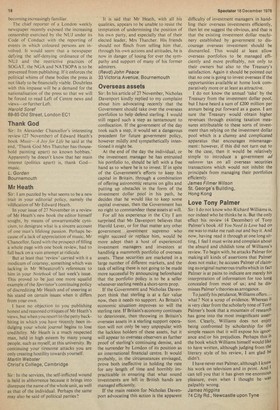Overseas assets
Sir: In his article of 27 November, Nicholas Davenport kindly replied to my complaint about him advocating recently that the Government should take over the overseas portfolios to help defend sterling. I would still regard such a step as tantamount to confiscation. If the government of the day took such a step, it would set a dangerous precedent for future government policy, however mildly and sympathetically intentioned it might be.
At the end of the day the individual, or the investment manager he has entrusted his portfolio to, should be left with a free hand as to where he is to invest. If in spite of the Government's efforts to keep his capital in Britain, through a combination of offering astronomic returns on gilts and putting up obstacles in the form of the investment dollar pool in his path, he decides that he would like to keep some capital overseas, then the Government has no right to commandeer these assets at will.
For all his experience in the City I am surprised that Mr Davenport believes that Harold Lever, or for that matter any other government investment supremo who might succeed or replace him, would be more adept than a host of experienced investment managers and investors at handlitig a mammoth portfolio of overseas assets. These securities are marketed in a large number of different markets, and the task of selling these is not going to be made more successful by announcing beforehand that the portfolio policy is to be a seller whenever sterling needs a short-term prop.
If the Government and Nicholas Davenport think that sterling is at a fair value now, then it needs no support. As Britain's economic situation improves so will the sterling rate. If Britain's economy continues to deteriorate, then throwing in Britain's overseas assets in a sterling support operation will not only be very unpopular. with the luckless holders of these assets, but it will appear to overseas observers as further proof of sterling's continuing demise, and the surrender by London of its position as an international financial centre. It would probably, in the circumstances envisaged, prove both ineffective in holding the rate for any length of time and horribly impracticable in ensuring that what sound investments are left in British hands are managed efficiently.
If the main reason for Nicholas Davenport advocating this action is the apparent difficulty of investment managers in handling their overseas investments efficiently, then let me suggest the obvious, and that is that the existing investment dollar machinery established by government to discourage overseas investment should be dismantled. This would at least allow overseas portfolios to be managed efficiently and more profitably, not only to their owners but also to the Treasury's satisfaction. Again it should be pointed out that no one is going to invest overseas if the opportunities available at home look comparatively more or at least as attractive.
I do not know the annual 'take' by the Treasury from the investment dollar pool, but I have heard a sum of £200 million per annum being put forward as a guess. I am sure the Treasury would obtain higher revenues through existing taxation measures attributable to these sorts of investment than relying on the investment dollar pool which is a clumsy and complicated apparatus that encourages mismanagement: however, if this did not turn out to be the case, then it would be relatively simple to introduce a government ad valorem tax on all overseas securities transactions which would not inhibit the principals from managing their portfolios efficiently.
James Filmer Wilson St. George's Building, Hong Kong














































 Previous page
Previous page